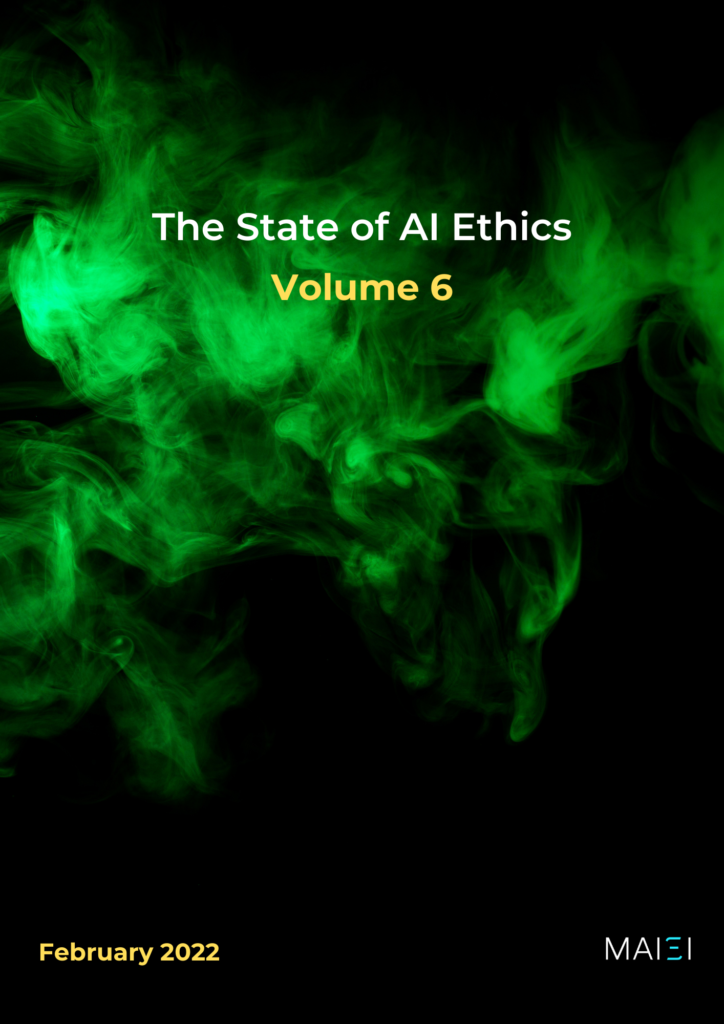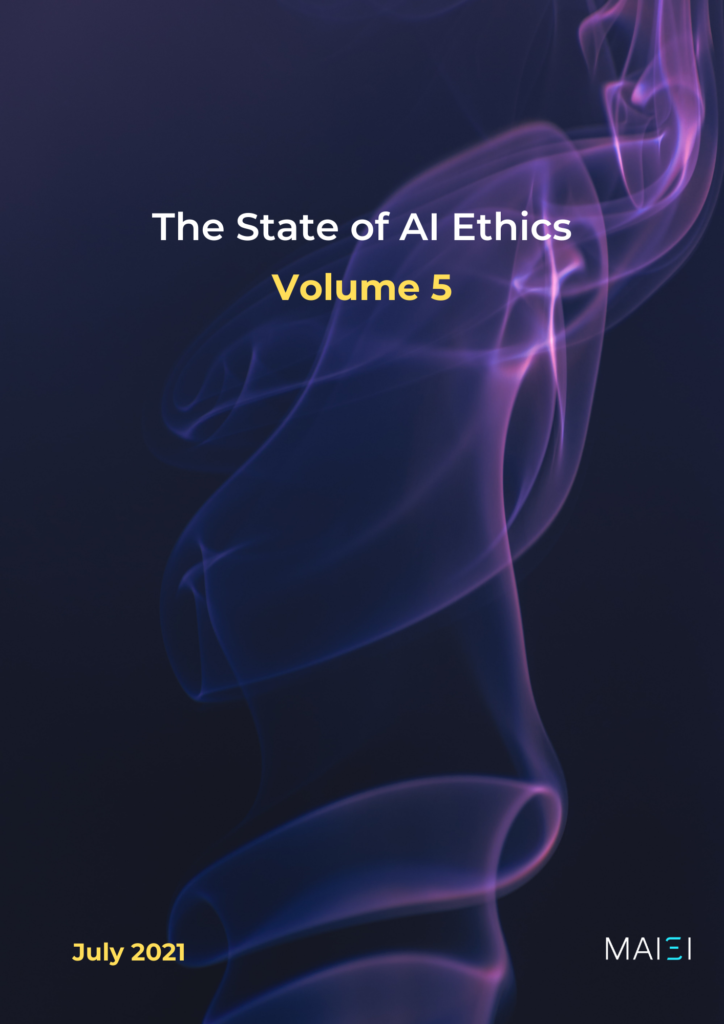This page houses all our State of AI Ethics Reports as well as the Panels associated with each report, ordered from most to least recent. Subscribe below to our weekly newsletter for the latest in AI Ethics.
The State of AI Ethics Report (volume 6) is our most comprehensive report yet touching nearly 300 pages covering
(1) What we’re thinking
(2) Analysis of the AI Ecosystem
(3) Privacy
(4) Bias
(5) Social Media and Problematic Information
(6) AI Design and Governance
(7) Laws and Regulations
(8) Trends and
(9) Outside the Boxes.
Our goal with these chapters is to provide both an in-depth analysis of each of those areas (but by no means exhaustive given the richness of each of these subdomains) along with a breadth of coverage for those who are looking to save hundreds of hours in trying to parse through the latest in research and reporting in the domain.
We’ve also got special contributions from Idoia Salazar, Michael Klenk, and Kathy Baxter providing chapter introductions. We also welcomed contributions from our network of collaborators and our thanks go out to
Ramya Srinivasan, Jonas Schuett, Jimmy Huang, Robert de Neufville, Natalie Klym, Andrea Pedeferri, Andrea Owe, Nga Than, Khoa Lam, Angshuman Kaushik, Avantika Bhandari, Sarah P. Grant, Anne Boily, Philippe Dambly, Axel Beelen, Laird Gallaghar, Ravit Dotan, Sean McGregor, and Azfar Adib.
The State of AI Ethics Report (volume 5) captures the most relevant developments in AI Ethics since the first quarter of 2021. We’ve distilled the research & reporting around 3 key themes:
- Creativity and AI
- Environment and AI
- Geopolitics and AI
We also have our evergreen section Outside the Boxes that captures insights across an eclectic mix of topic areas for those looking for a broad horizon of domains where AI has had a societal impact. And we bring back the community spotlights to showcase meaningful work being done by scholars and activists from around the world.
This edition opens with a section that has been much requested by you, our community, titled “What we’re thinking” that gives insights into emergent trends and gaps that we’ve noticed in existing coverage of AI ethics. We also have a special contribution titled “The Critical Race Quantum Computer: A Tool for Liberation” by Michael Lipset, Jessica Brown, Michael Crawford, Kwaku Aning, & Katlyn Turner with a very intriguing framing of how we think about race and technology.
The State of AI Ethics Panel (December 2020)
Now that we’re nearly halfway through 2021, what’s next for AI Ethics? Hear from a world-class panel, including:
- Soraj Hongladarom — Professor of Philosophy and Director, Center for Science, Technology and Society at Chulalongkorn University in Bangkok (@Sonamsangbo)
- Dr. Alexa Hagerty — Anthropologist, University of Cambridge’s Centre for the Study of Existential Risk (@anthroptimist)
- Connor Leahy — Leader at EleutherAI (@NPCollapse)
- Stella Biderman — Leader at EleutherAI(@BlancheMinerva)
- Abhishek Gupta – Founder, Montreal AI Ethics Institute (@atg_abhishek)
These panelists wrote exclusive content for volume 4 of our State of AI Ethics Report, which can be found just below.
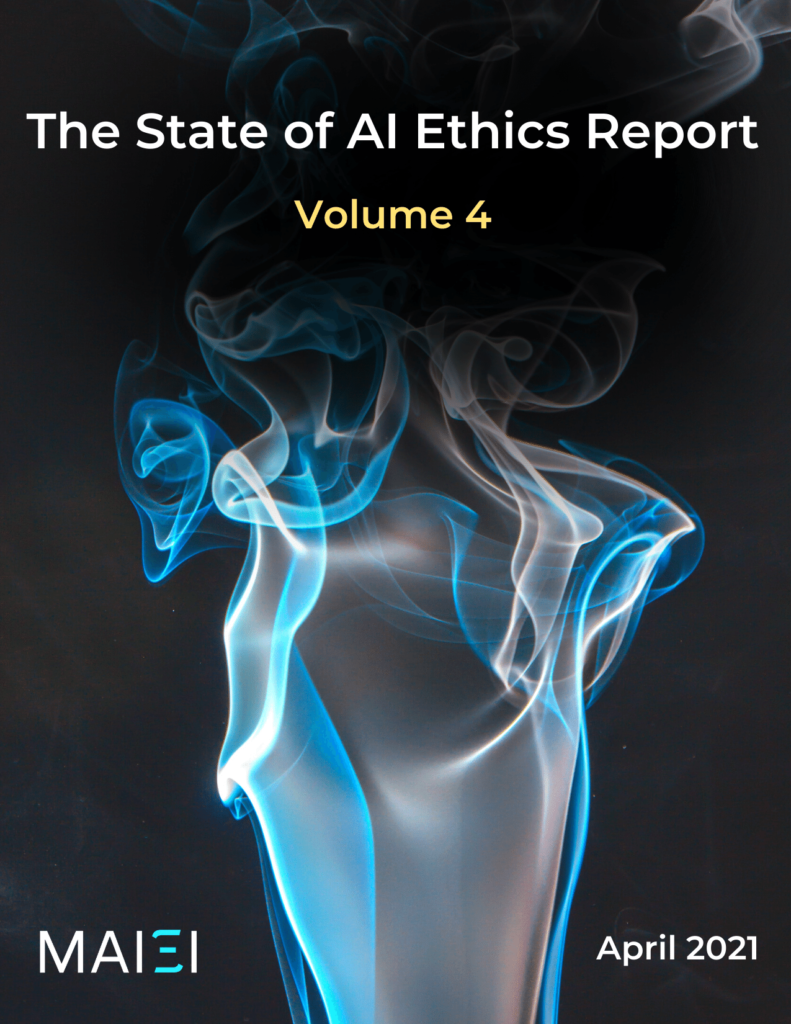
The State of AI Ethics Report (volume 4) captures the most relevant developments in AI Ethics since the beginning of 2021. We’ve distilled the research & reporting around 4 key themes:
- Ethical AI
- Fairness & Justice
- Humans & Tech
- Privacy
This edition opens with AI and the Face: A Historian’s View — a long-form piece by Edward Higgs (Professor of History at the University of Essex) about the unscientific history of facial analysis, and how AI might be repeating some of those mistakes at scale.
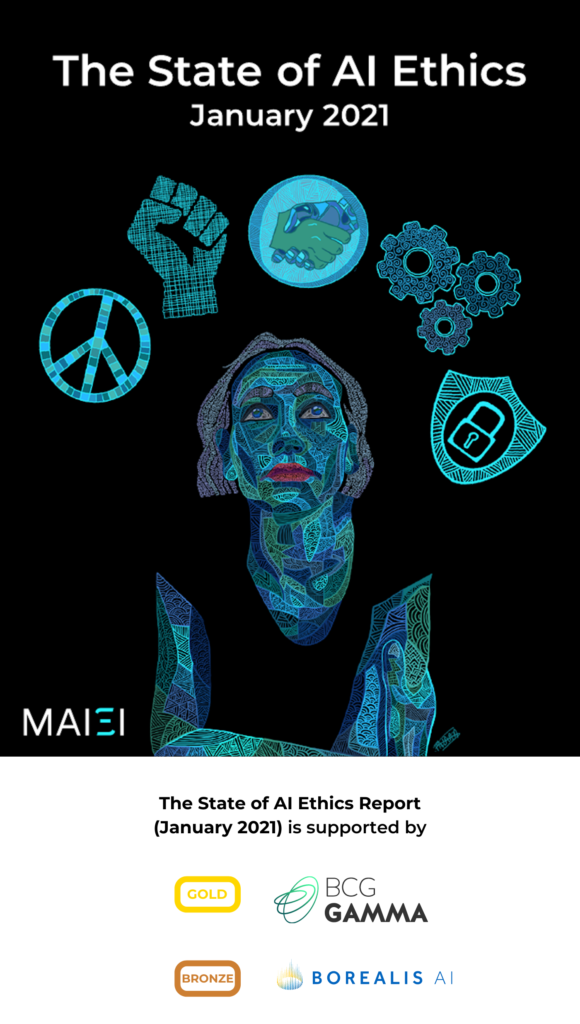
The State of AI Ethics Report (January 2021) captures the most relevant developments in AI Ethics since October of 2020.
To save you time and quickly get you up to speed on what happened in the past quarter, we’ve distilled the research & reporting around 8 key themes:
- Algorithmic Injustice
- Discrimination
- Ethical AI
- Labor Impacts
- Misinformation
- Privacy
- Risk & Security
- Social Media
The report includes exclusive content written by world-class AI Ethics experts. This edition opens with The Abuse and Misogynoir Playbook — a 20-page joint piece by a group of MIT professors & research scientists (Danielle Wood, Katlyn Turner, Catherine D’Ignazio) about the mistreatment of Dr. Timnit Gebru by Google and the broader historical significance around this event.
Other contributors include:
- Steven Mills (Managing Director & Partner, Chief AI Ethics Officer, Boston Consulting Group)
- Kathryn Hume (Interim Head, Borealis AI)
- Mona Sloane (Adjunct Professor, NYU)
- Blakeley H. Payne (Independent Researcher)
- Jade Abbott (Machine Learning Lead, Retro Rabbit)
- Max Santinelli (Associate Director Data Science, Boston Consulting Group)
- George Obaido (Researcher), Kehinde Aruleba (Researcher), Lauri Goldkind (Professor, Fordham)
TM BCG GAMMA and Logo Design are trademarks of Boston Consulting Group. Used under licence.
TM BOREALIS AI and Logo Design are trademarks of Royal Bank of Canada. Used under licence.
The State of AI Ethics Panel (December 2020)
A transcript of the live chat discussion that took place during the event, including a curated list of resources mentioned, can be found here.
Panelists included:
- Rumman Chowdhury — Global Lead for Responsible AI, Accenture (@ruchowdh)
- Danit Gal — Tech Advisor, United Nations (@danitgal)
- Katya Klinova — AI & Economy Program Lead, Partnership on AI (@klinovakatya)
- Amba Kak — Director of Global Policy & Programs, NYU’s AI Now Institute (@ambaonadventure)
- Abhishek Gupta — Founder, Montreal AI Ethics Institute (@atg_abhishek)
- Victoria Heath (Moderator) — Researcher, Montreal AI Ethics Institute (@victoria_heath7)
These panelists wrote exclusive content for the October edition of our State of AI Ethics Report, which can be found just below.
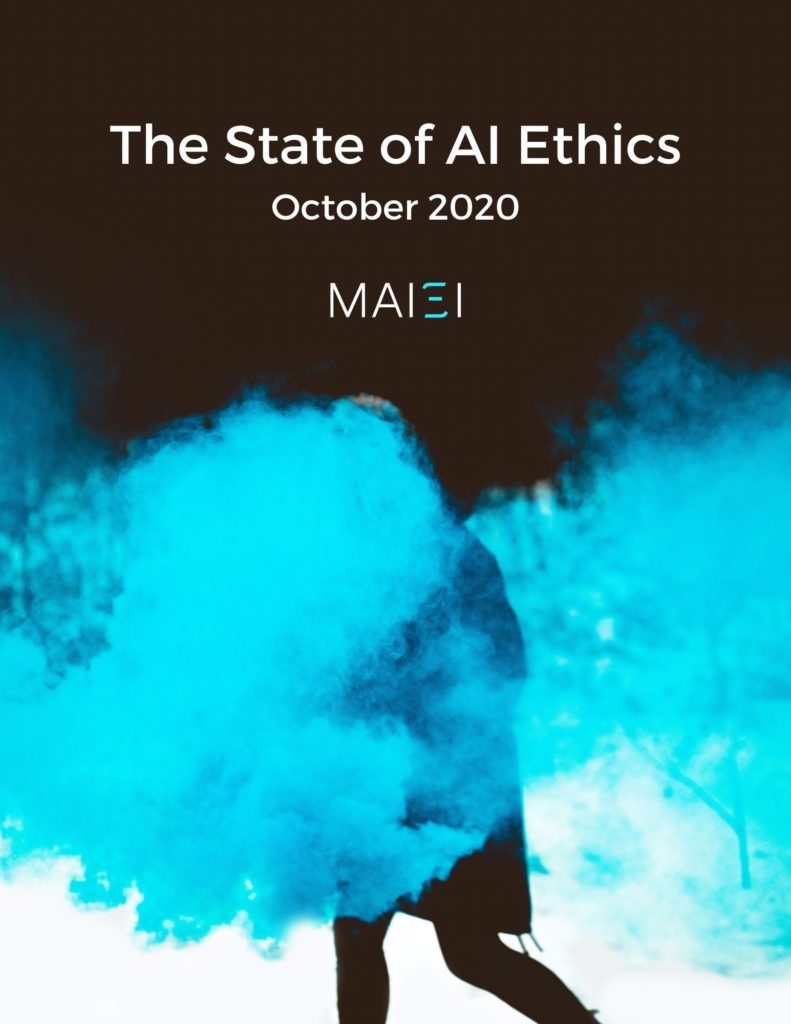
This report captures the most relevant developments in AI Ethics since July of 2020.
Includes exclusive content written by:
- Danit Gal (Tech Advisor, United Nations)
- Amba Kak (Director of Global Policy & Programs, NYU’s AI Now Institute)
- Rumman Chowdhury (Global Lead for Responsible AI, Accenture)
- Brent Barron (Director of Strategic Projects & Knowledge Management, CIFAR)
- Adam Murray (U.S. Diplomat working on tech policy, Chair of the OECD Network on AI)
- Thomas Kochan (Professor, MIT Sloan School of Management)
- Katya Klinova (AI & Economy Program Lead, Partnership on AI)
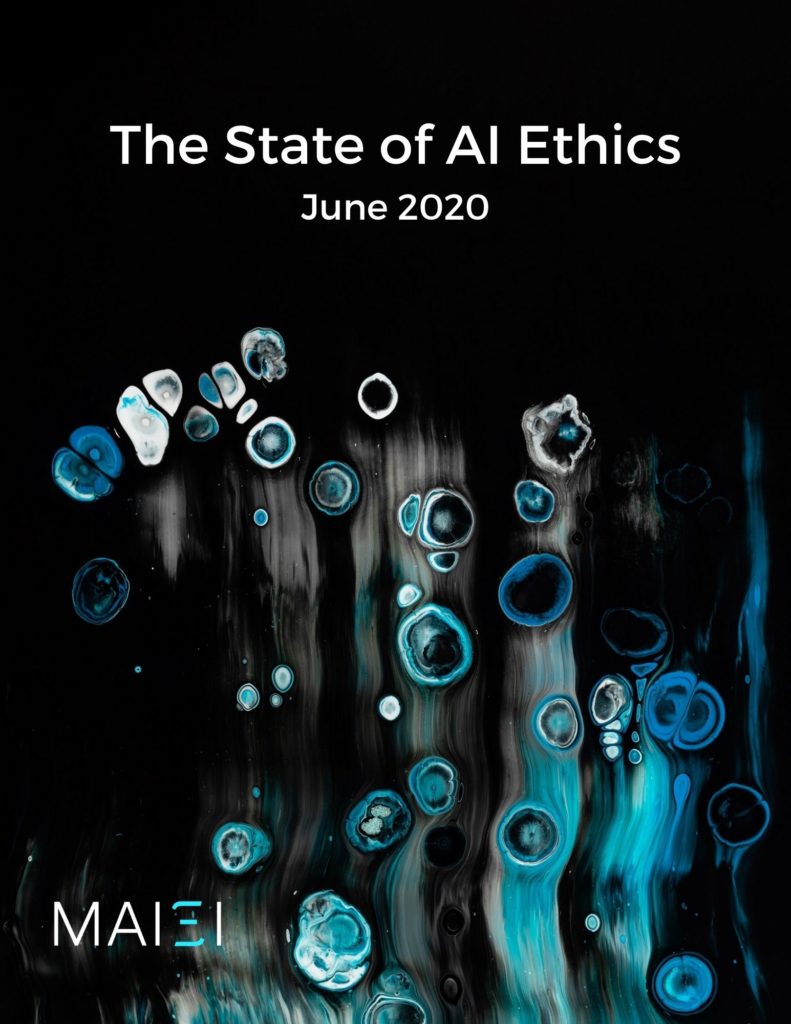
With this inaugural edition of the State of AI Ethics we hope to bring forward the most important developments that caught our attention at the Montreal AI Ethics Institute between March and June of 2020.
Topics include:
- Agency and Responsibility
- Security and Risk
- Disinformation
- Jobs and Labor
- Bias and Algorithmic Justice
- Law and Governance
- Humans and AI
- And more!

